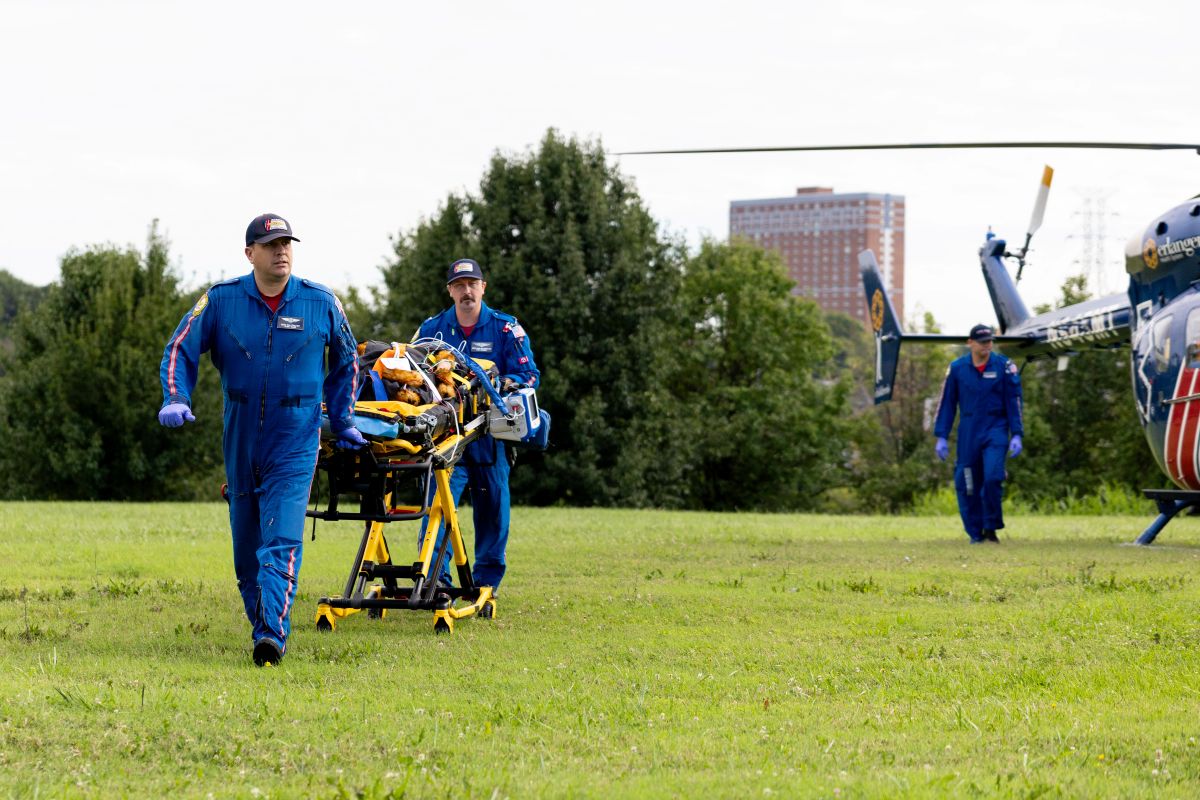
Historic Partnership Provides Tennessee’s Police Dogs Access to Lifesaving Emergency Air Transport
KNOXVILLE, Tenn. – The University of Tennessee College of Veterinary Medicine (UTCVM) and Erlanger LIFE FORCE Air Medical have completed the first-ever dry run of transporting a critically injured K-9 officer by helicopter, marking a historic advancement in veterinary emergency medicine and law enforcement support in Tennessee.
The inspiration for emergency K-9 air transport traces back to the 2017 line-of-duty death of Cain, a Crossville police K-9 officer. Cain suffered a stab wound while apprehending a suspect and was transported to UTCVM by ground. Although UT veterinary specialists walked first responders through first aid over the phone, the K-9 officer succumbed to his injuries. Experts believe he might have survived if he had reached specialized veterinary care more quickly by air. His death sparked ongoing efforts to establish rapid air transport protocols for K-9 officers injured in the line of duty, aiming to increase their survival rates in critical situations.
“There’s a concept in trauma medicine called the ‘golden hour,’ which refers to the first hour after an injury,” explains Leslie Wereszczak, emergency and critical care director at UTCVM. “Timely intervention, hemorrhage control, and beginning treatment quickly can be the difference between life and death and is as critical for dogs as it is for humans. Air transport dramatically shortens time to care, giving K-9 officers a fighting chance.”
The training exercise, conducted in Knoxville, simulated the emergency transport of a police dog injured in the line of duty. LIFE FORCE flight crews, law enforcement officers, and a veterinary emergency and critical care team practiced every step of the process, from helicopter landing, ground transfer, and stretcher loading to arrival at the veterinary intensive care unit.
“This has been a long time coming,” said Stacy Prater, LIFE FORCE flight paramedic and canine transport coordinator. “Two and a half years ago, we started planning how to safely and quickly move a critically injured K-9 officer to a tertiary care veterinary facility. After gaining approval from the state Veterinary Board and Emergency Medical Services Board, we trained our entire staff, and became the first EMS agency in Tennessee authorized to do this and only the fifth air medical program in the nation.”
LIFE FORCE helicopters are now equipped with specialized veterinary supplies, including muzzles, oxygen masks and chest tube kits, in addition to their standard emergency and critical care equipment.
For both veterinary medical professionals and law enforcement, the mission goes beyond logistics. “To me, they’re more than just dogs,” Prater said. “These K-9s are heroes. They didn’t choose this work, but every day they protect their handlers and our communities. They deserve the same level of care as any other officer.”
The exercise not only demonstrated the feasibility of K-9 helicopter transport but also reinforced the commitment of UTCVM and LIFE FORCE to support the safety of police officers, both human and canine, who protect us. UT Police Department, Knoxville Police Department, and Knoxville Fire Department also participated in the training. In addition to UTCVM, LIFE FORCE can transport injured K-9s to three other facilities, all in Chattanooga: VCA Regional Institute for Veterinary Emergencies and Referrals; VCSG – Veterinary Care & Specialty Group; and Animal Emergency & Specialty Center.
The University of Tennessee Institute of Agriculture is comprised of the Herbert College of Agriculture, UT College of Veterinary Medicine, UT AgResearch and UT Extension. Through its land-grant mission of teaching, research and outreach, the Institute touches lives and provides Real. Life. Solutions. to Tennesseans and beyond. utia.tennessee.edu.